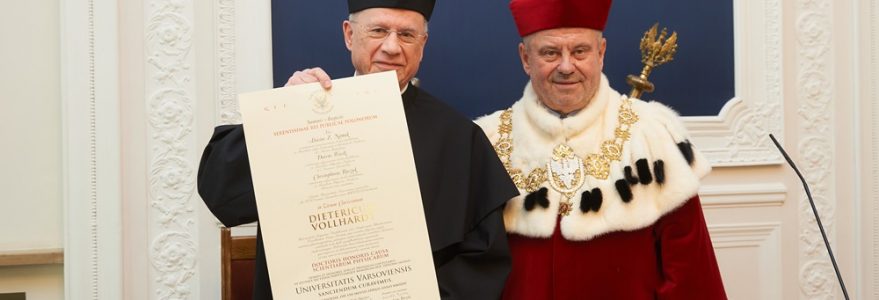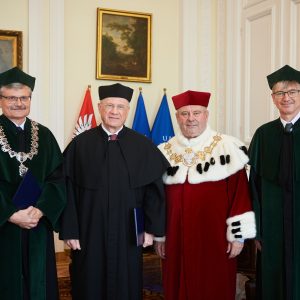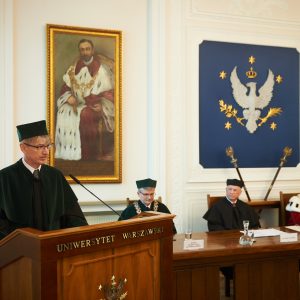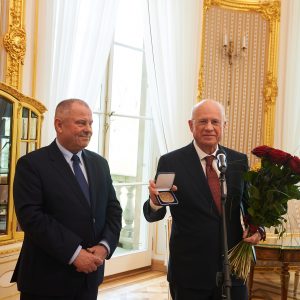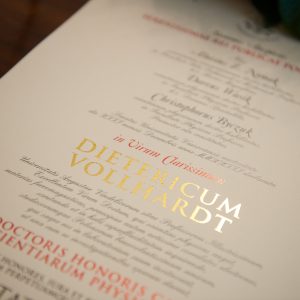The University of Warsaw conferred the title of Doctor Honoris Causa upon Prof. Dieter Vollhardt, a world-renowned theoretical physicist and expert in electronic correlations and magnetism. The conferral ceremony was held on 8th April.
“We are delighted to bestow the title of Doctor Honoris Causa upon Prof. Dieter Vollhardt, whose exceptional contributions to the field of the theory of electronic correlations and magnetism have left an indelible mark in publications in numerous prestigious scientific journals,” said Prof. Alojzy Z. Nowak, the Rector of the University of Warsaw. “We are proud and grateful for the collaboration and partnership in the pursuit of knowledge and excellence with researchers and doctoral candidates, especially with Prof. Krzysztof Byczuk.”
As professor emeritus at the University of Augsburg, Prof. Dieter Vollhardt investigates the theory of electronic correlations and magnetism. The renowned scientist have made exceptional contributions to the field of physics, i.e. superconductivity and superfluidity, disordered systems. The groundbreaking achievement of the researcher was formulating the dynamical mean-field theory (DMFT) – the best approximate theory describing electrons interacting in crystals. This method turned out to be a breakthrough enabling research of various phenomena caused by electronic correlations.
A renowned scientist and educator
The conferral ceremony included the presentation of the honorary degree and address by Prof. Krzysztof Byczuk from the Institute of Theoretical Physics, Faculty of Physics, University of Warsaw. Prof. Dieter Vollhardt graduated from the University of Hamburg. In 1979, he was awarded with a doctoral degree at his Alma Mater, mainly for his research conducted at the University of Southern California, Los Angeles. In 1984, the researcher defended his habilitation thesis at the Technical University of Munich. Between 1987 and 1996, he was professor at the RWTH Aachen University, then, between 1996 and 2018, at the Institute of Physics, as well as at the Centre for Electronic Correlations and Magnetism, University of Augsburg.
The scientist is a co-author of 218 scientific papers published in such prestigious journals as Nature, Nature Physics, Nature Communication or Physical Review Letters. Together with Prof. Peter Wölfle, he is the author of the book The superfluid phases of Helium 3, cited around two thousand times. Overall, Prof. Vollhardt’s papers have been cited nearly twenty one thousand times. The h-index is 67 (according to Google Scholar).
In his address Prof. Byczuk underscored the visionary leadership and unwavering commitment in research networks by the German Research Foundation (GE: Deutsche Forschungsgemeinschaft, DFG). Prof. Vollhardt was a spokesman of two networks: the Cooperative Phenomena in Solids: Metal-Insulator Transitions and Ordering of Microscopic Degrees of Freedom between 2000 and 2009, and the Research Unit Dynamical Mean-Field Approach with Predictive Power for Strongly Correlated Materials. For his academic achievements he received many prizes and distinguishments, including the Europhysics Prize of the European Physical Society in 2006, Max Planck Medal in 2010, and Freenberg Memorial Medal in 2022.
Cooperation with the Faculty of Physics
“I am extremely proud that the Senate of the University of Warsaw recognized Prof. Vollhardt’s outstanding achievements and contributions to science, and his longstanding collaboration with the University and the Faculty of Physics,” Prof. Dariusz Wasik, the Dean of the Faculty of Physics, said.
The cooperation of the scientist with the Faculty of Physics started in 2000, when the UW researcher, then Dr Krzysztof Byczuk, carried out his research fellowship at the University of Augsburg, and got involved in the projects of Prof. Vollhardt’s group. The two worked together with other scientists on the ferromagnetic theory, which concerns the analysis of photoemission spectra in correlated electron systems, the derivation of the Curie-Weiss law in dynamical mean-field theory, and the ferromagnetism and metal-insulator transitions in correlated electron systems with alloy disorder. From 2005 to 2008, Prof. Byczuk did another internship with the team of Prof. Vollhardt. The other scientists working with Prof. Byczuk were also invited to collaborate with the German researcher: Dr Anna Kauch, Dr Jaromir Panas, Dr Banhi Chatterjee, and Dr Jan Skolimowski. This resulted in numerous publications and scientific articles.
In his speech, Prof. Dieter Vollhardt explained both the core of his research and scientific collaboration with the University of Warsaw. The honoured scientist has been lecturing at the UW frequently. The scientist described his visits at Hoża and Pasteura, watching the Faculty of Physics transformation. While delivering his speech, he referred to the lecture “Magnetism: from ancient Greece to modern Warsaw” of 2022.
“Over a year ago I had a unique opportunity to engage in a series of “Zapytaj fizyka”. I would like to emphasize that fruitful scientific cooperation throughout many years can only be accomplished in the air of mutual respect and trust. Thus, the international cooperation results in scientific progress and cultural enhancement,” Prof. Vollhardt said.
Prof Vollhardt’s group was also an international partner of the project “Predictive multi-scale simulations for correlated particles inside complex enviroments”, led by Prof Byczuk. Between 2011 and 2015, the project was funded with the TEAM grant given by the Foundation for Polish Science (PL: Fundacja na rzecz Nauki Polskiej, FNP). Prof. Bollhardt also supported a FNP’s international PhD project conducted at the University of Warsaw.
The conferral ceremony took place on 8th April, in the Senate Hall of Kazimierzowski Palace. Prof. Dieter Vollhardt was also honoured with the University of Warsaw Medal.



